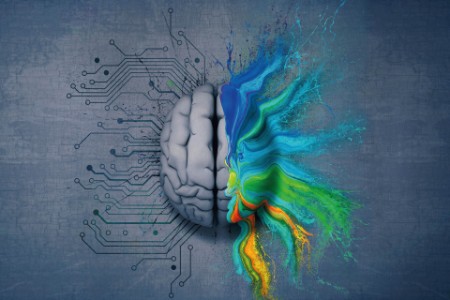Ethics of AI is a societal issue
The second aspect – are the decisions of AI algorithms ethical? – is a question for us all. Frank De Jonghe: “When a person is driving and simultaneously has to avoid a child and a senior citizen, they react intuitively. With AI, we suddenly have to really think about the ethical question of whether we are to incorporate priorities, and what they are.
“Another example: VDAB [Flemish Service for Employment and Vocational Training] makes job proposals to jobseekers based on algorithms. If a person refuses these offers repeatedly, their unemployment benefits can be affected. But shouldn't we take the relevance of the recommendations into account? What if the algorithm makes recommendations that systematically channel certain groups of the population into certain jobs based on historical stereotypes that are embedded in the code?”
Patrice Latinne: “It is not only up to the data researcher to determine whether the AI system is ethically sound or not when it targets clients or assesses the risks of fraud, for example. Firstly, it is and remains the responsibility of each organization to ask themselves the question, ‘Are we using AI for the right purpose?’.”
“Before that, the question must be answered by those responsible for the business and communicated systematically to the entire development chain. From the initial design of the AI system to the time of its activation in production, and even while it is doing its work, it is crucial to know which data are being used, how the AI model functions and how it will ultimately update itself automatically, the client groups it impacts and whether an ethical problem may arise in respect of consumers and employees, for example. At EY, we think it’s equally important to advise our clients on the technical development of AI applications and these types of issues of trust and ethics.
No matter what, companies are exposed to the risk of reputational damage whether they use AI or not. Whether it's a person or an algorithm who is racially prejudiced when granting credit, the organization is the one who remains responsible. In any case, companies must remain vigilant when it comes to ethical questions. That is necessary, but not simple.
“Thirty academic teams were once asked to examine whether racial basis was a factor in red cards being given in soccer. Surprisingly, the teams arrived at completely opposite results. That is to say, it is particularly difficult to answer these types of questions. But as a company, you have to be able to demonstrate that you are at least identifying and monitoring potential sore spots,” Frank De Jonghe says.
Are we ready for AI?
The possibilities of AI are exploding and there are great benefits for the taking. Nevertheless, tech giants are the ones who are primarily reaping the benefits at this point.
When introducing AI, there are all types of considerations to make the pieces fit together. What issue does AI solve? What does it cost? Does the company have the proper in-house skills, technologies and infrastructure?
Patrice Latinne: “Also importantly, is AI ‘business- and ethically critical’? The algorithm a bank uses to recommend a certain financial product to a client is a bit more complex than the one Amazon uses to recommend a book to a customer. An error with the client’s money is more ethically sensitive than with their literary preference. Customer experience and satisfaction are more readily jeopardized with these types of banking and insurance issues."
Frank De Jonghe adds: “It is important for companies to focus on what they want to do with AI and what they want to achieve with it. I was recently having a sales conversation with my electricity provider and I told him I don’t care about smart meters. When asked why, I said I did not like my supplier knowing when I was there or gone so it can perform load forecasting. The salesman didn't even know that this was his company’s intention... If there isn’t any transparency about AI’s purpose and added value, it is difficult to introduce AI to the broad public.


